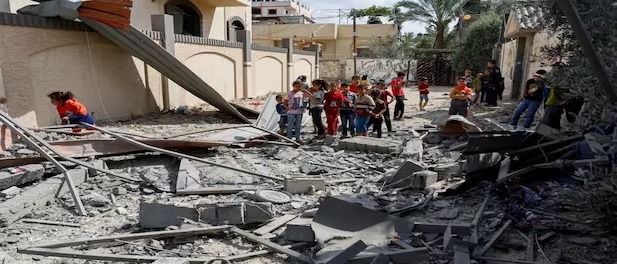
Israel Kills Another Militant Commander In Gaza As Fighting Goes On, Truce Efforts Falter5 min read

Israel says it is trying to avoid conflict with Hamas, the more powerful militant group that rules Gaza, and limit the fighting to Islamic Jihad.
Israeli airstrikes in the Gaza Strip killed a fourth militant commander on Thursday, raising the death toll from the latest burst of fighting to 25. Israel braced for more rocket fire amid reports of faltering Egyptian attempts to broker a cease-fire.

It has been the worst bout of fighting between Israel and Palestinian militants in Gaza in months, and among the dead were also women and children. The conflagration comes at a time of soaring tensions and spiking violence over the past year in the West Bank.
Early on Thursday, the Israeli military carried out strikes against the Islamic Jihad militant group and said a senior commander in charge of the group’s rocket launching force, Ali Ghali, was killed when his apartment was hit.
According to Palestinian media reports, the strikes targeted the last floor of a building at a residential, Qatari-built complex in southern Gaza Strip, killing at least two people, including the commander. The Health Ministry in Gaza said 25 people had been killed since the fighting erupted.
Following intense fighting on Wednesday, when rockets rained down on southern and central Israel and airstrikes pounded Gaza, a state-run Egyptian TV station announced that Egypt, a frequent mediator between the sides, had brokered a cease-fire. But with the violence continuing into the early hours of Thursday, it appeared neither side was backing down.
The Israeli military says that in its strikes it has zeroed in on militants with what it says are precision strikes, but children, among them a 4-year-old, were also killed. Military spokesman Rear Adm. Daniel Hagari told Israeli Army Radio Thursday that a quarter of the rockets launched during this round of fighting fell in Gaza, killing at least four, including a 10-year-old girl .
In a prime-time TV address on Wednesday, Israeli Prime Minister Benjamin Netanyahu claimed that Israel had dealt a harsh blow to the militants. But he cautioned: “This round is not over.”
“We say to the terrorists and those who send them. We see you everywhere. You can’t hide, and we choose the place and time to strike you,” he said, adding that Israel would also decide when calm is restored.
Israel launched strikes early Tuesday against top Islamic Jihad commanders, killing three and setting off a burst of rocket fire on Wednesday that set off air-raid sirens throughout southern and central Israel. Damage was reported when rockets slammed into buildings that were empty because residents had fled the area. Israeli officials said some 400 rockets were fired toward Israel. Most, they said, were intercepted or fell in open areas.
It was the heaviest fighting between the sides in months, pushing the region closer toward a full-blown war. But in signs that both sides were trying to show restraint, Israel avoided attacks on the ruling Hamas militant group, targeting only the smaller and more militant Islamic Jihad faction. Hamas, meanwhile, appeared to remain on the sidelines.
Israel and Hamas have fought four wars since the Islamic militant group took control of Gaza in 2007.
Late Wednesday, Egypt’s Extra News television channel, which has close ties to Egyptian security agencies, said the Egyptian intelligence had brokered a cease-fire. Israeli officials confirmed that Egypt was trying to facilitate a cease-fire. Speaking on condition of anonymity to discuss behind-the-scenes diplomacy, they said Israel would evaluate the situation based on actions on the ground, not declarations.
Islamic Jihad said it would continue firing rockets. Mohamad al-Hindi, an official with the group, said a sticking point in the talks was that the Palestinians wanted an Israeli commitment to stop targeted killing operations, such as the ones that killed three top Islamic Jihad commanders early Tuesday.
As rockets streaked through the sky, Israeli TV stations showed air defense systems intercepting rockets above the skies of Tel Aviv. In the nearby suburb of Ramat Gan, people lay face-down on the ground as they took cover.
The army said that schools would remain closed and restrictions on large gatherings would remain in place in southern Israel until at least Friday. Residents were instructed to stay near bomb shelters.
The initial Israeli airstrikes on Tuesday that set off the exchange of fire killed three senior Islamic Jihad militants and at least 10 civilians — most of them women and children. The Israeli military has said its attacks were focused on Islamic Jihad militant infrastructure in the coastal enclave.
Israel says the airstrikes are a response to a barrage of rocket fire launched last week by Islamic Jihad in response to the death of one of its members from a hunger strike while in Israeli custody.
Israel says it is trying to avoid conflict with Hamas, the more powerful militant group that rules Gaza, and limit the fighting to Islamic Jihad.
Israel has come under international criticism for the high civilian toll Tuesday, which included wives of two of the militant commanders, some of their children and a dentist who lived in one of the targeted buildings along with his wife and son.
In past conflicts, rights groups have accused Israel of committing war crimes due to high civilian deaths. Israel says it does its utmost to avoid civilian casualties and holds militant groups responsible because they operate in heavily populated residential areas.




















